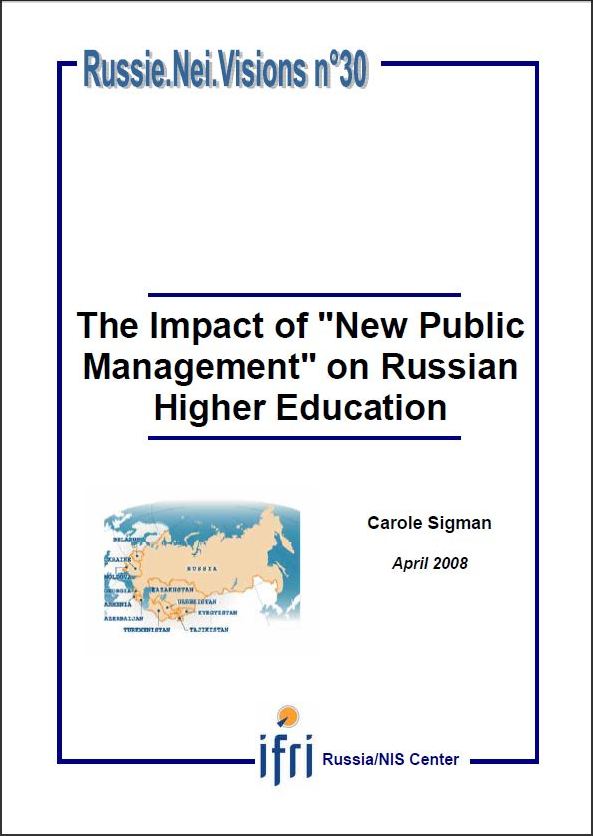The Impact of "New Public Management" on Russian Higher Education

The higher education reform underway in Russia is part of a much broader state reform project. Launched in 2004 at the start of Vladimir Putin's second term, this "administrative reform" grants the federal state the means to reclaim the public sphere, which largely escaped from its control during the 1990s. Energy incomes having considerably improved the public finances in the 2000s, the state can now consider reinvesting in and restructuring the public sphere as a whole. Its involvement cannot be seen as the construction of a "welfare state," but comes rather closer to an entrepreneurial state at the head of sectorial trusts aiming to be competitive on global markets. Such as it appears today, the restructuring of higher education is key to understanding how the formation of this entrepreneurial state is conceived and what possible structural uncertainties could arise.
This paper is based on the seminar presentation "Higher Education in Russia, Potential and Challenges," which took place on 28 January 2008 at the Institut français des relations internationales (Ifri).
Download the full analysis
This page contains only a summary of our work. If you would like to have access to all the information from our research on the subject, you can download the full version in PDF format.
The Impact of "New Public Management" on Russian Higher Education
Related centers and programs
Discover our other research centers and programsFind out more
Discover all our analysesRussia, the Palestinians and Gaza: Adjustments after October 7th
The Soviet Union (USSR), and subsequently the Russian Federation as its internationally recognized legal successor, has consistently sought to play a visible role in efforts to resolve the Israeli-Palestinian conflict.
Deathonomics: The Social, Political, and Economic Costs of War in Russia
The report attempts to outline and examine a truly new phenomenon in Russian society, dubbed “deathonomics”—the making of a mercenary army against the backdrop of the Kremlin’s war in Ukraine, eventually replacing both the Soviet (conscript) and early new Russian (contract) armies. It notes that, by the end of 2023, this trend had turned the military service into one of the highest-paying professions in the country, something not seen in Russia on such a scale since the late 17th century.
Russia's Asia Strategy: Bolstering the Eagle's Eastern Wing
Among Russia’s strategic priorities, Asia traditionally played a secondary role compared to the West. In the mid-1990s, then Foreign Minister Yevgeny Primakov initiated a rapprochement with China and India. Then, in 2014, deteriorating relations between Russia and the West prompted Moscow to begin its “great pivot to the East”.
Kazakhstan After the Double Shock of 2022: Political, Economic and Military Consequences
The year 2022 represented a dual shock for Kazakhstan. In January, the country faced its most severe political crisis since independence, followed in February by Russia’s full-scale invasion of Ukraine, which cast uncertainty over the borders of post-Soviet states. These consecutive crises profoundly shaped Kazakhstan’s domestic and foreign policy.











